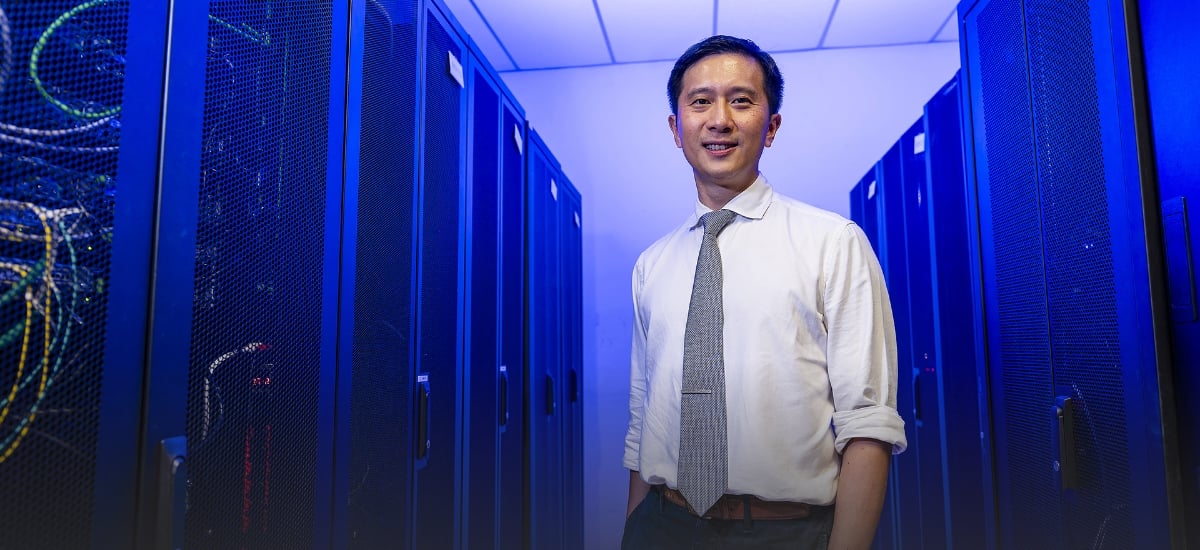Published on 24 April 2024
NUHS A/Prof Ngiam is boldly seeking out new frontiers, pushing the boundaries of MedTech with one aim – to enhance the lives of patients.
Ask A/Prof Ngiam Kee Yuan what his favourite movie is, and without missing a beat, the National University Health System (NUHS) Group Chief Technology Officer (GCTO) and space enthusiast will reply, Interstellar (a dystopian film about a team of astronauts searching for a new, habitable planet to save humanity from a dying Earth). In fact, he is such a galaxy fanatic that he’s named two tech programmes in NUHS after NASA space shuttles: Discovery AI and Endeavour AI.
It’s no surprise to learn that the 48-year-old spends his spare time dabbling with complex computer science concepts and binge-watching videos on SpaceX and rocket launches. These hobbies follow him to work, where the innovator breaks new ground with trailblazing tech.
“When I joined NUHS in 2012, I wanted to do two things: First, I wanted to set up some kind of data platform that allows us to do research more effectively. And the other is to harness this to translate our research work into real-world solutions,” he shared.
Impact is a key motivator for Prof Ngiam, who sees NUHS’ inroads in MedTech innovation as an opportunity to propel Singapore to become a thought leader for other countries to emulate.
“[As an individual], I can operate on patients and see patients for the rest of my life. The maximum number I’ll see is maybe 30,000 people maximum over a 30-year period,” he said. “However, by using Artificial Intelligence (AI) to support hospital as well as community level operations, the impact will be in the millions. In building technology, your impact is also felt beyond Singapore because the same technology or processes can then be applied elsewhere.”
Shooting for the moon
This drive to spread innovation is also why Prof Ngiam wears many hats in addition to his GCTO title.
As a clinician, he is Head & Senior Consultant, Division of General Surgery (Endocrine & Thyroid Surgery), Department of Surgery at National University Hospital (NUH). He is also Senior Consultant, Division of Surgical Oncology at the National University Cancer Institute, Singapore (NCIS).
As an educator, he is Associate Professor for the Department of Surgery at Yong Loo Lin School of Medicine (NUS Medicine). He also heads the division of biomedical informatics, which he created in 2020 to educate and foster a pipeline of talent.
In a master’s degree programme that he set up in partnership with NUS, students undertake internships with NUHS, working on real-life projects. Upon programme completion, employment opportunities are extended to the top five per cent of the graduating cohort.
Highlighting this unique synergy between the university and hospital, Prof Ngaim stated that, “this ecosystem is like a nursing ground for our future talent.”
For Prof Ngiam, propelling Singapore and NUHS to become a thought leader means going above and beyond developing solutions or increasing efficiency. “You don't become a good Academic Health System by just improving things. You become an Academic Health System by doing novel things, moonshot things — things that are ideally new, and also have real impact.”
Prompting a sea change
Since assuming the role of GCTO in 2017 — a newly-created position — Prof Ngiam has been developing, sourcing, and deploying innovations for NUHS to put Singapore’s healthcare on the world map.
2018 — launch of Discovery AI
Jointly developed by NUHS and NUS, Discovery AI is one of the first secure data platforms that enables researchers to share large amounts of healthcare data, serving as a sandbox for the development of multiple ground-breaking AI tools.
2021 — adoption of HoloMedicine
Various techniques were built around HoloLens, a visualisation headset that incorporates mixed reality to improve patient outcomes, such as locating veins for more accurate blood draws.
2022 — launch of Endeavour AI
This secure and powerful platform pulls together ‘live’ data from the healthcare cluster’s Electronic Medical Records (EMR) system, while multiple AI components such as predictive tools, dashboards, mixed reality devices, robots and large language models operate in real-time.
2024 — launch of MISSI
The nursing bot inspired by Prof Ngiam’s fascination with extraterrestrial exploration: “Instead of spending millions, billions and sending robots to Mars…why not we have a robot in the hospital to look after humans?” he questioned.
Built to help nurses cut down on time-consuming and mundane tasks to focus on their patients and self-development, some of MISSI’s duties are to monitor and prevent patient falls. Still a work in progress, MISSI will be able to carry out wound care, swabs and more soon, as well as tell a joke when in an elevator with humans...perhaps in dialect!
“I know it's completely random, but you know it just gives the robot a little human touch, a little personality,” quipped Prof Ngiam. “Hopefully it brightens up people's days as well.
Truth be told, MISSI would probably be devoid of personality and artificial intelligence if Prof Ngiam had remained resistant to large language models (LLM) such as ChatGPT, a technology that took the world by storm since its launch in November 2022.
2024 — launch of RUSSELL-GPT
RUSSELL-GPT is NUHS’ very own secure healthcare generative AI model. With the help of an on-site supercomputer named Prescience, he works closely with doctors to develop specific prompts that allow it to reduce toil and to train the generative AI tool to answer questions with higher than 90 per cent accuracy.
By helping doctors write referral letters and summarising patient case notes in seconds compared to hours, RUSSELL-GPT greatly reduces the time they spend preparing before doing their patient rounds. In addition, doctors can pose questions to the AI model, such as assessing a patient’s re-admission risk or coming up with their optimal treatment plan based on a whole body of data.
“This changes healthcare, because we are not now reliant on one or two persons making decisions for a patient,” said Prof Ngiam.
In encapsulating his work at NUHS, he remarked, “Well as you can see, over the last 10 years or more, I had a lot of fun.”
In consultation with A/Prof Ngiam Kee Yuan, Group Chief Technology Officer, NUHS; Head & Senior Consultant, Division of General Surgery (Endocrine & Thyroid Surgery), Department of Surgery, NUH; Senior Consultant, Division of Surgical Oncology, NCIS; and Associate Professor, Department of Surgery, NUS Medicine.




